Unit 4 I used to be afraid of the dark. 单词课件(共96张PPT)人教版英语九年级全册
文档属性
| 名称 | Unit 4 I used to be afraid of the dark. 单词课件(共96张PPT)人教版英语九年级全册 | 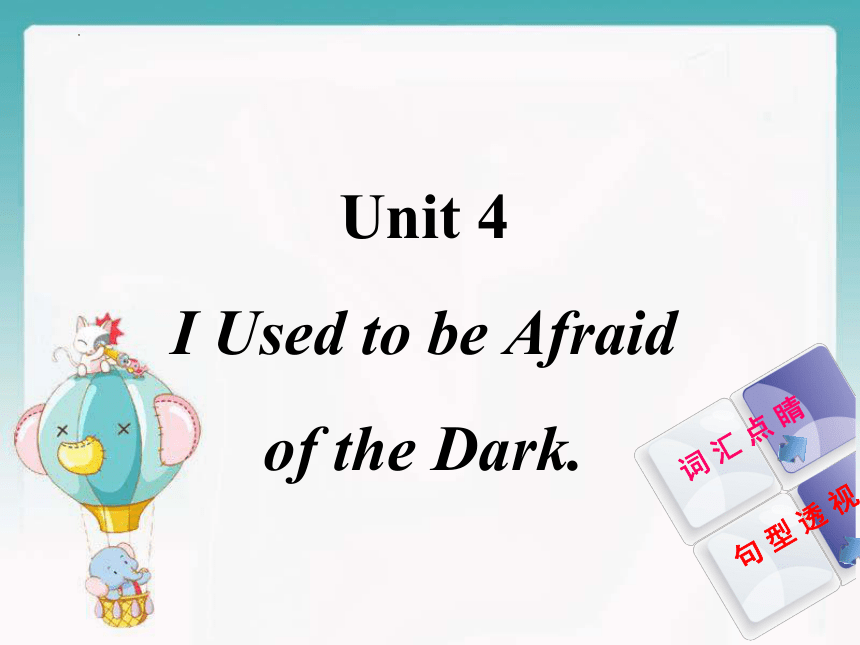 | |
| 格式 | pptx | ||
| 文件大小 | 1.4MB | ||
| 资源类型 | 教案 | ||
| 版本资源 | 人教新目标(Go for it)版 | ||
| 科目 | 英语 | ||
| 更新时间 | 2024-10-21 08:17:01 | ||
图片预览

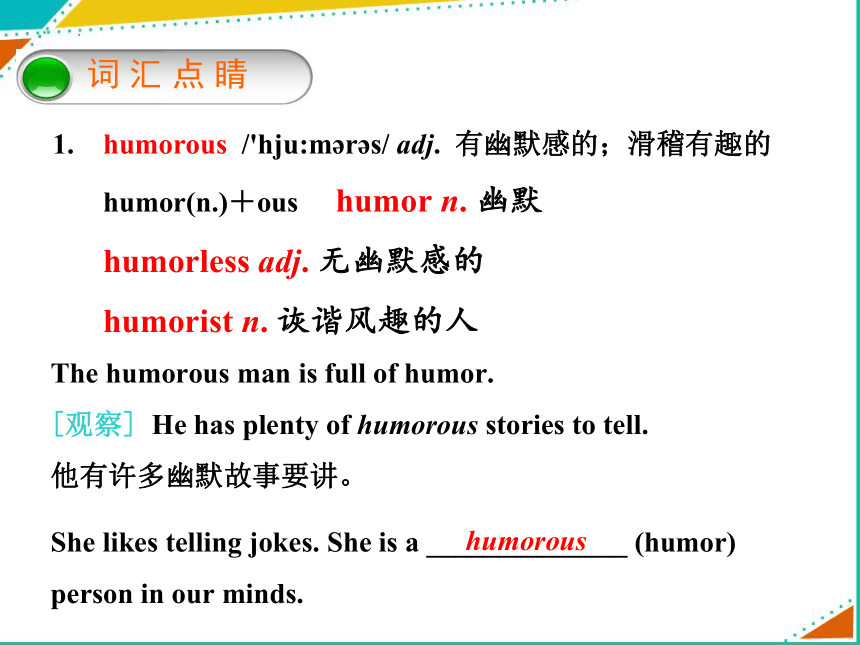
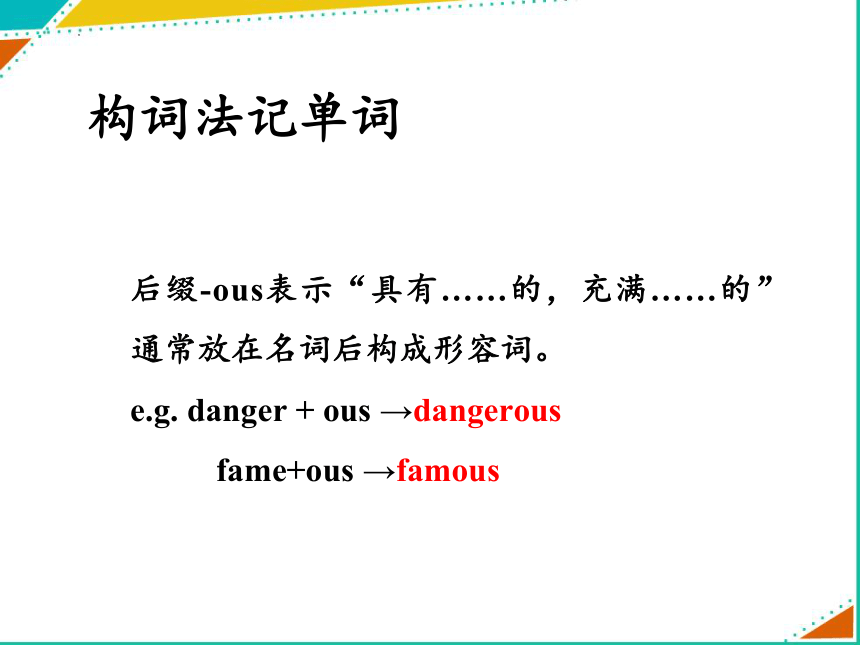
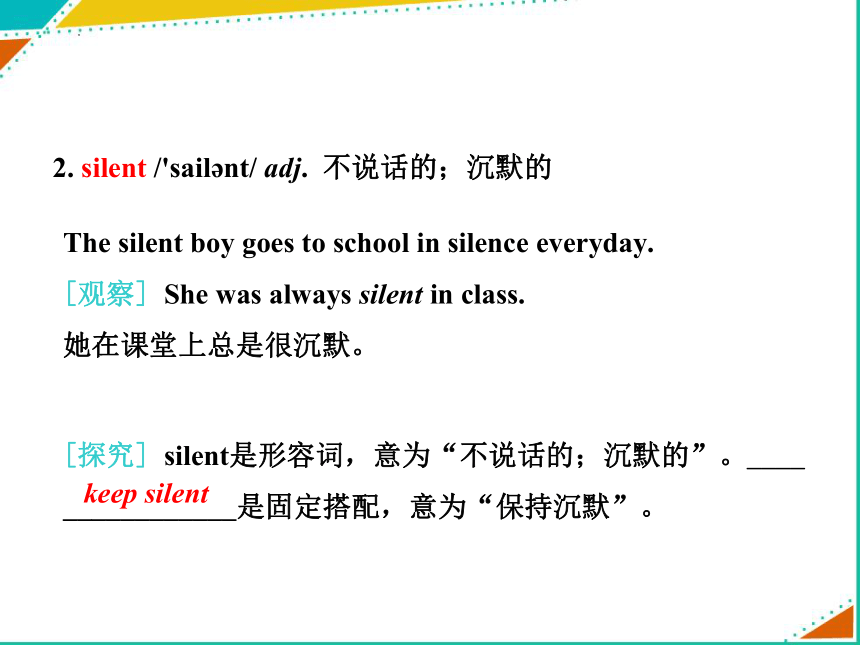
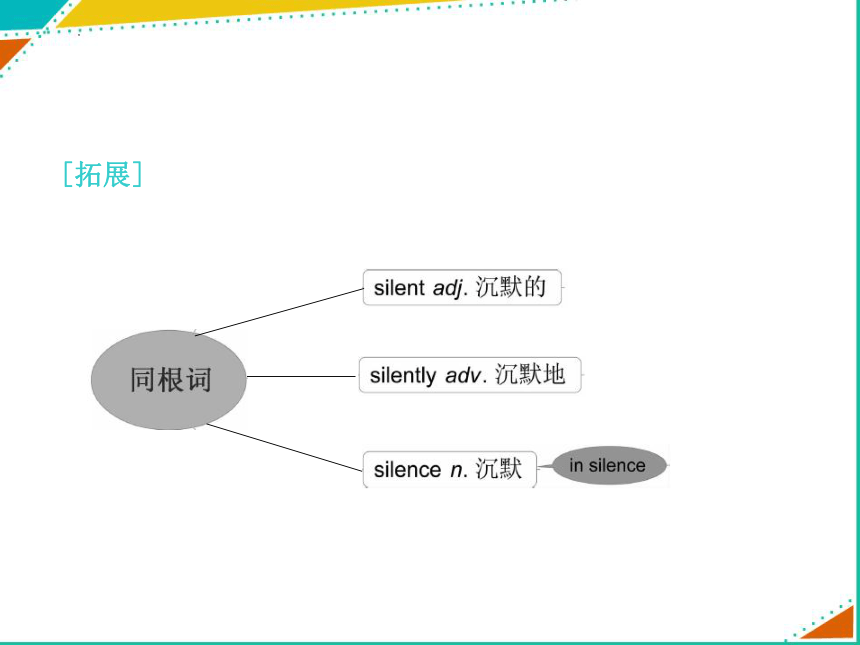
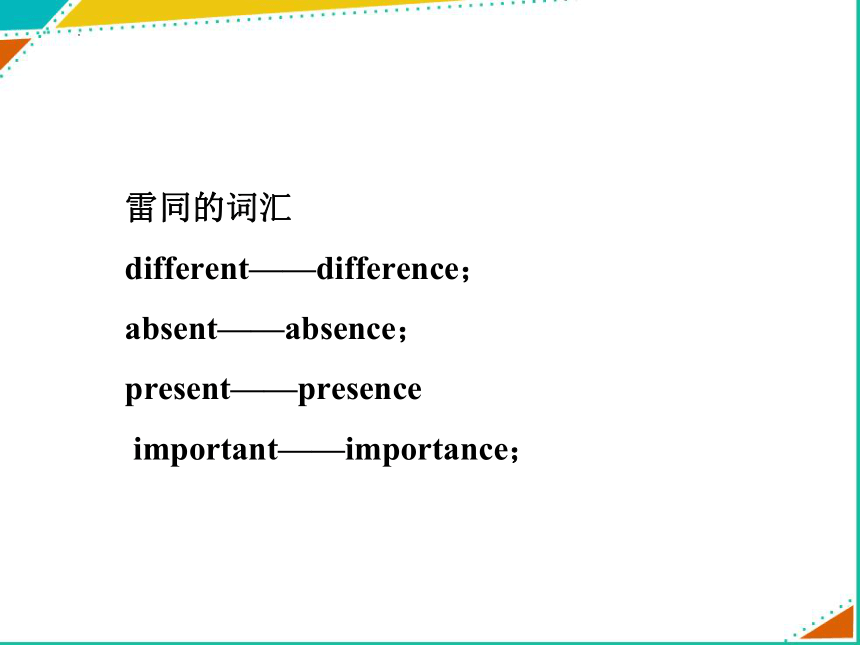
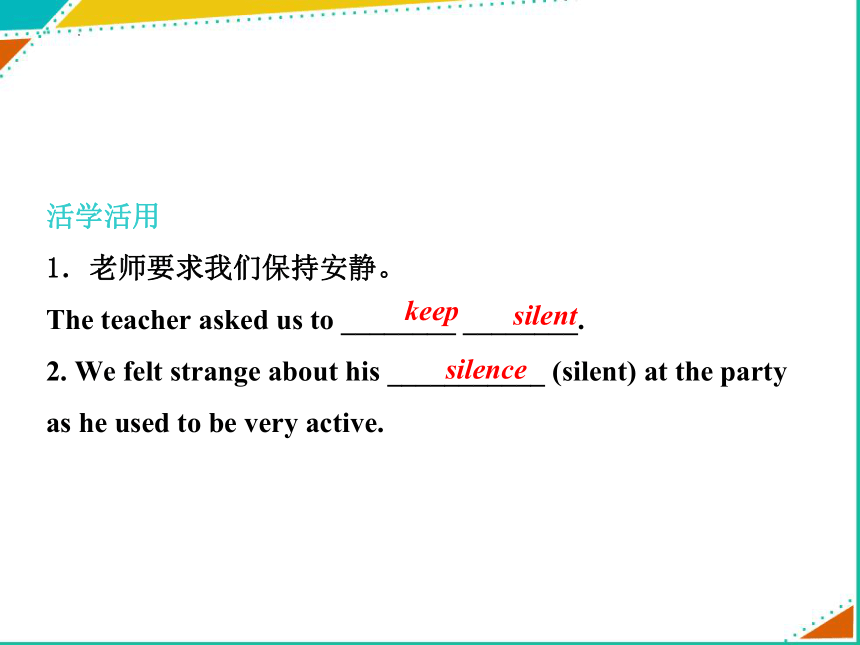
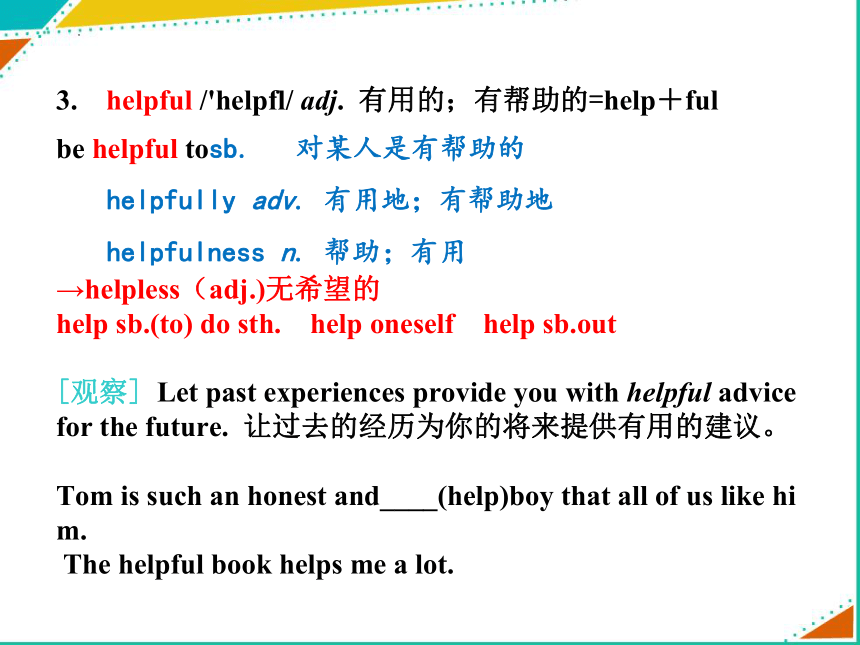

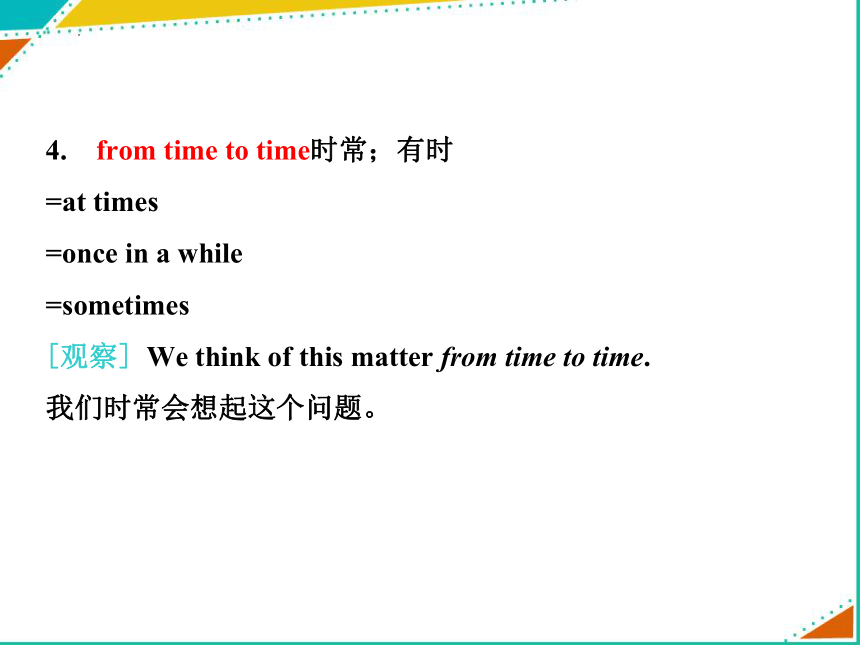
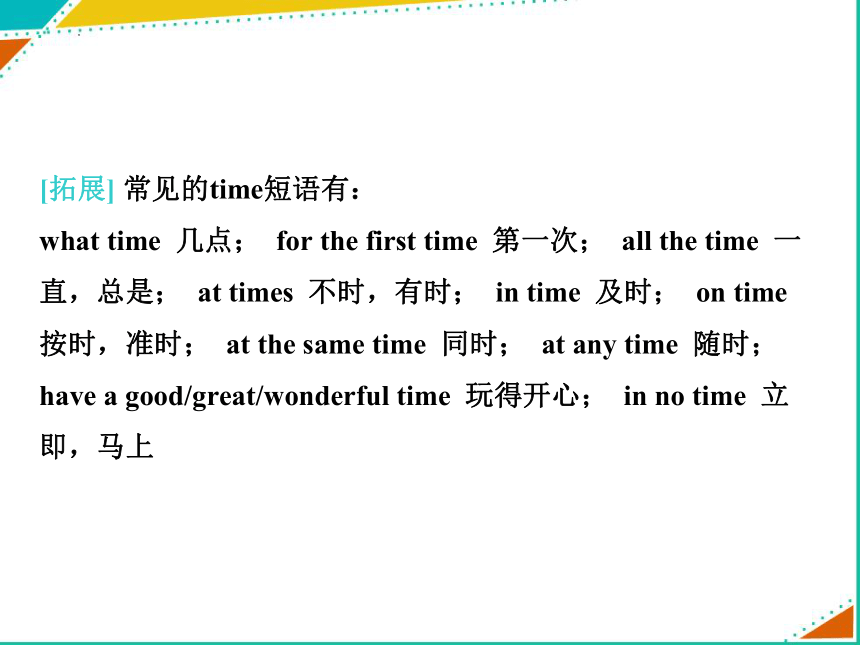
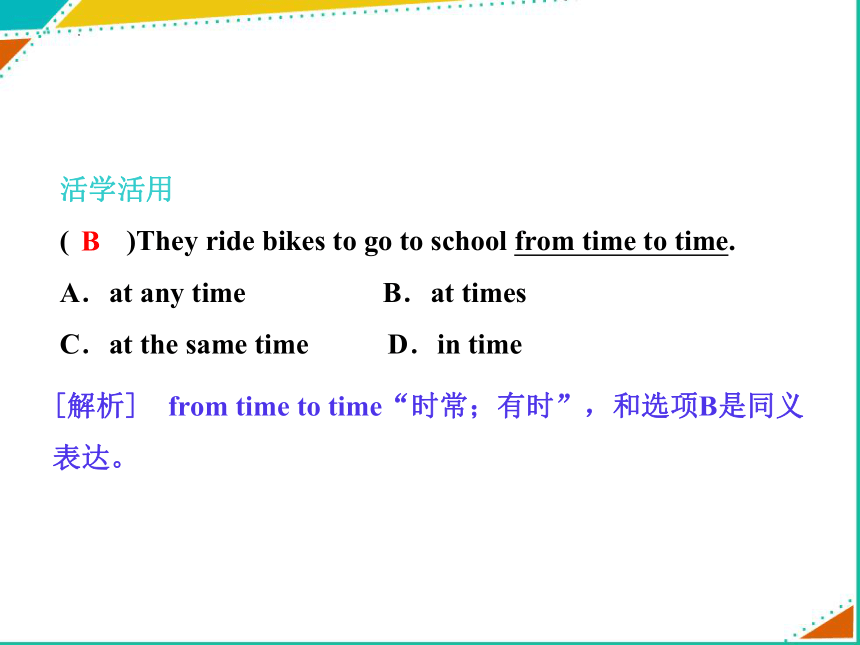
文档简介
(共96张PPT)
词 汇 点 睛
句 型 透 视
Unit 4
I Used to be Afraid of the Dark.
词 汇 点 睛
1. humorous /'hju:m r s/ adj. 有幽默感的;滑稽有趣的
humor(n.)+ous humor n. 幽默
humorless adj. 无幽默感的
humorist n. 诙谐风趣的人
The humorous man is full of humor.
[观察] He has plenty of humorous stories to tell.
他有许多幽默故事要讲。
She likes telling jokes. She is a ______________ (humor)
person in our minds.
humorous
后缀-ous表示“具有……的,充满……的”通常放在名词后构成形容词。
e.g. danger + ous →dangerous
fame+ous →famous
构词法记单词
2. silent /'sail nt/ adj. 不说话的;沉默的
The silent boy goes to school in silence everyday.
[观察] She was always silent in class.
她在课堂上总是很沉默。
[探究] silent是形容词,意为“不说话的;沉默的”。________________是固定搭配,意为“保持沉默”。
keep silent
[拓展]
雷同的词汇
different——difference;
absent——absence;
present——presence
important——importance;
活学活用
1.老师要求我们保持安静。
The teacher asked us to ________ ________.
2. We felt strange about his ___________ (silent) at the party as he used to be very active.
keep
silent
silence
3. helpful /'helpfl/ adj. 有用的;有帮助的=help+ful
be helpful tosb. 对某人是有帮助的
helpfully adv. 有用地;有帮助地
helpfulness n. 帮助;有用
→helpless(adj.)无希望的
help sb.(to) do sth. help oneself help sb.out
[观察] Let past experiences provide you with helpful advice for the future. 让过去的经历为你的将来提供有用的建议。
Tom is such an honest and____(help)boy that all of us like him.
The helpful book helps me a lot.
[拓展] 以“ful”为后缀的形容词还有:通常放在名词或动词末尾构成形容词,表示“充满……的,有……的”。
care n. 小心 careful adj. 小心的
use n. 用途 useful adj. 有用的
beauty n. 美丽 beautiful adj. 美丽的
peace n. 平静;和平 peaceful adj. 平静的;和平的
thank n. 感谢 thankful adj. 感谢的
活学活用
Our teacher gave us a lot of __________ (help) books in math.
helpful
4. from time to time时常;有时
=at times
=once in a while
=sometimes
[观察] We think of this matter from time to time.
我们时常会想起这个问题。
[拓展] 常见的time短语有:
what time 几点; for the first time 第一次; all the time 一直,总是; at times 不时,有时; in time 及时; on time 按时,准时; at the same time 同时; at any time 随时; have a good/great/wonderful time 玩得开心; in no time 立即,马上
活学活用
( )They ride bikes to go to school from time to time.
A.at any time B.at times
C.at the same time D.in time
B
[解析] from time to time“时常;有时”,和选项B是同义表达。
5.score /sk :(r)/ n. & v. 得分;打分
Messi used to get good ________ .
get good scores=get good grades 取得好成绩
I got a good score in the English exam.
我在英语考试中得到一个好的分数。
score two goals 进了两个球
6.background /'b kgraund/ n. 背景=back+ground
have no working background 没有工作背景
scores
7. interview /'int (r)vju:/ v. 采访;面试 n. 面试;访谈
(1)interview sb. 采访某人
(2)interview sb. about sth. 就某事采访某人
(3)have an interview with sb. 采访某人
[观察] For this month's Young World magazine, I interviewed 19 year old Asian pop star Candy Wang.为了这个月的《青年世界》杂志,我采访了19岁的亚洲流行歌手坎迪 王。
The interview went well. 面试进行得非常顺利。
n.Charles enjoys talking to people and hopes to be a interviewer.
[探究] interview既可作动词,还可作____________。
[拓展] 派生词:interviewer n. 面试者;采访者
interviewee n. 被访问者;被采访者
The interviewer is interviewing an interviewee.
这个采访者正在采访一个被采访者。
活学活用
They are going to have an ____________ (采访) tomorrow morning.
interview
名词
8. Asian /'ei n / adj. 亚洲/人的; n. 亚洲人
Asia---Asian Europe----European
Africa—African Russia---Russian
England---British Amirica--American
Australia--Australian India---Indian
Asian Games 亚运会
Many Asian countries have used bamboo for hundreds of years.许多亚洲国家已经使用竹子几百年了。
9.deal/di:l /v.对付,对待
10. deal with对付;应付
[观察] I have a huge pile of letters to deal with.
我有一大堆信件要处理。
deal with 应对,处理,侧重于处理问题的方式、方法,常与疑问词how 连用。
do with 也意为“应对;处理”,侧重于处理的对象,常与疑问词what 连用
活学活用
你知道怎样处理这个问题吗?
Do you know how to ______ ______ the problem
Do you know what to do with the problem
deal
with
11.shyness / ' ainis // ' ain s /n.害羞,腼腆(un.)
shy adj.害羞的
The boy used to be_____ in front of crowds.
He didn’t know how to deal with his________.
“shy(adj. 害羞的)+ness(名词后缀)”构成的。
名词后缀-ness,通常放在形容词后,构成抽象名词。
e.g. carelessness n.粗心 darkness 黑暗
happiness 高兴 sadness 难过
tiredness 疲劳;疲倦 kindness仁慈,亲切,和蔼
shy
shyness
12.dare /de /, /der/ v. 敢于;胆敢
dare通常不用于进行时态
dare to do sth. 敢于做某事
e.g. He doesn’t dare to jump from the top of the wall. 他不敢从墙上跳下来。
在多数情况下dare都用作及物动词,和带to的不定式一起用:dare有人称和数的变化,有现在时和过去时的形式,可以与助动词连用。We must dare to act.The girl did not dare to go home alone.Who dares to jump over the stream 归纳:肯定句:dare +do = dare +to do否定句:daren't +do = don't dare to do疑问句:Dare…do… = Do…dare to do… )
dare的用法
1)dare 作实义动词,后跟动词不定式作宾语,有人称和数以及时态的变化。构成疑问句和否定句时要借助助动词do 的适当形式。 I dare to jump down from the top of the wall. 我敢从那墙头上跳下来。 She doesn't dare (to) watch TV . 她不敢看电视。
2)dare 还可用作情态动词, 后跟动词原形, 没有人称和数的变化, 主要用于疑问句、否定句中。否定句在dare 后面加not, 疑问句把dare 提前。How dare she do things like that to me 她怎么敢对我做那种事 ---Dare you catch the mouse 你敢去抓那只老鼠吗? ---I daren't do that. 我不敢抓。
13.crowd /kra d /n.人群;观众 v.拥挤 crowded adj. 拥挤的
They all crowded into the cinema.
他们全都挤进了电影院。
The shop is crowded with the crowd at weekends.
be crowded with 挤满
The road is crowded with cars 路上挤满了汽车
14.ton /t n / n.吨
get tons of attention 被众人所关注
tons of sth. 很多;极多 后接不可数名词或可数名词复数,相当于a lot of。
e.g. They have tons of work every day.
I bought tons of apples while they were cheap.
15.private /'praivit/ /'praiv t/ adj. 私人的;私密的=personal
→privately(adv.)私人地
in private(私下地)”中,反义词组为in public公开地。
pay a private visit 进行私人访问
e.g. Mr. Smith is rather secret about his private life.
史密斯先生对自己的私生活相当保密。
16.guard /ga:(r)d/ n. 警卫;看守v. 守卫;保卫
The camp guards are changed every night.营区的守卫每夜都更换。guard 此处用作可数名词,意为“守卫,警卫”。
The dog guarded the house.
17.require /ri'kwai (r)/ v. 需要;要求=need n.requirement
(1)require sth 需要,依靠
These pets require a lot of care and attention
(2)require sb to do sth 需要某人做某事
At the beginning of the new term, all students will be required to take a short test.
(3) (sth) require doing sth 某事需要被做做=require to be done
This book is required reading for this course.
(4)require that + 从句 需要,要求
在require引导的宾语从句中,谓语动词用“should +动词原形”,should可省略。
The situation required that he (should) be present.
练习:The floor requires ____________.(wash)Students are required ____________classes.(attend)They required us ____________them. (help)These temples require ____________next month (repair)These temples require ____________next month.(repair)I required that she_________(go) at once
18.European / j ( )r 'pi: n/ adj.欧洲(人)的 n.欧洲
The Europeans comes from Europe.
Darwin(达尔文) is a European scientist.
19.African /' fr k n /adj.非洲(人)的n.非洲的
Africans comes from Africa.
20.British /'briti / adj. 英国的;英国人的
The people in Britain speak British English.
People in Britain speak British English.
21.speech/spi:t / n. 讲话;发言 pl. speeches
at the speech contest 在演讲比赛中
give a speech 做演讲
The boy used to be a great ________.
He dared to give a _______ in public.
22.public /'p bl k / n.民众 adj.公开的;公众的
23.in public 公开地,在别人(尤指生人)面前
speaker
speech
24.ant / nt/ n. 蚂蚁 an ant
Here are a lot of ants on the ground.地上有很多蚂蚁。
have ants in one’s pants; 坐立不安
25.insect /'insekt/ n. 昆虫 an insect
I used to catch ants and watch insects when I was a child.
Section B
26. seldom /'seld m/ adv.不常;很少
[观察] As a small child, he seldom gave his parents any problems, and they were proud of him. 当他还是小孩子的时候,他很少给他的父母惹麻烦,他的父母为他感到骄傲。
[探究],近义词:hardly adv. 意为“几乎不”。通常放在be动词、助动词或情态动词之后,实义动词之前,表示否定意义。
e.g. She seldom goes out after ten o’clock. 十点后,她很少外出。
He is seldom late for school. 他很少迟到。
seldom 具有否定意义, 用于反意疑问句时, 附加问句要用肯定形式。
e.g. He seldom goes to work by car, does he
他很少开车上班,对吗?
含有hardly, never, few, little, none, nothing, nobody等词的句子变反意疑问句时也要用肯定反问。用于句首表示强调,句子主谓语用到装. Seldom does he have breakfast.
Section B
活学活用
( )[2013·淮安] My uncle doesn't like fast food, so he ________ eats it.
A.always B.often
C.sometimes D.seldom
D
Section B
27. influence /'influ ns/ v. & n.影响
influence sb./sth.影响某人或某事
What we read influences our thinking.
我们所阅读的书本会影响我们的思想。
influence sb. to do sth. 影响某人做某事
e.g. What influenced you to take up nursing
是什么影响你去从事护理工作的?
have an influence on...
=make a difference to对……有影响
Listening to music has a great influence on her.
听音乐对她有很大的影响。
under the influence of... 受到……的影响
The girl chose science under the influence of her father.
女孩在爸爸的影响下选择了理科。
Section B
Cell phones have an important influence on our life.手机对我们的生活影响很大。
Their mother is a good influence on their habits. 他们的母亲对他们的习惯有好的影响。
活学活用
[2013·柳州] 根据句意及首字母提示补全单词
Believe in yourself. Don't let others i________ your decision.
nfluence
Section B
28. absent /' bs nt/ adj. 缺席;不在→absence(n.)缺席
[观察] He was often absent from classes, so he failed his
examinations. 他经常逃课,所以考试不及格。
The manager is very angry at John’s absence.
经理因为约翰的缺席很生气。
____________________意为“缺席”。
be absent from
[拓展] 反义词:present adj. 出席的;到场的
be absent in+地点 外出在某地
He is absent in Shanghai.他外出在上海
Section B
29. fail /feil/ v.不及格;失败;未能(做到)
failure n. 失败
fail in sth. 在某方面失败,(反义短语是succeed in sth. 在某方面成功)
e.g. He failed the exam. 他考试不及格。
fail to do sth.未能做到某事
He failed to climb up the tall tree. 他未能爬上那棵高树。 fail的名词形式failure
Failure is the mother of success. 失败是成功之母。
[拓展] 反义词:succeed v. 成功 pass v. 及格;考试通过
e.g. 1)fail( in) (doing) sth. 表示“在某方面失败/做某事失败
e.g. I failed in everything I tried. 我所有的尝试都失败了。
2)fail to do sth.表示“未能做到某事”。e.g. She failed to get into art college. 她没能考上美院。
3)fail 意为“不及格”时,既可作及物动词,也可作不及物动词。 e.g. He failed (in) the exam. 他考试不及格。
Many diets fail because they’re boring. 许多节食失败了,因为太枯燥了。
Section B
活学活用
( )He was unhappy, because he ________ his driving test.
A.succeeded B.failed
C.missed D.passed
B
[解析] 句意:他不高兴,因为他驾驶执照考试不及格。故fail符合题意。(1) Their car failed ______ the high mountain. A. to climb B. climbing
(2) I don’t know why she failed ______ the driving test. A. on B. in
30.examination /ig z mi'nei n/ n. 考试;审查=exam
I used to fail the examination .
e.g. He is feeling sad about his examination.
他为自己考的不好而难过
31.boarding /'b :(r)di / school 寄宿学校
board v.寄宿
His parents used to go to the boarding school in person to see his son.
Section B
32. in person亲身;亲自
[观察] He will be present at the meeting in person.
他将亲自参加会议。
[探究] in person意为“亲自;亲身”,与“for oneself”同义。
活学活用
你必须亲自来这里。
You must come here ____ ____________.
in
person
in the end 最后=at last
in short 简而言之 in time 及时
in common 共同 in all 总共
in a hurry 匆忙 in fact 事实上
in future 今后 in silence 安静地
常见的由in 构成的短语还有:
33.exactly /ig'z ktli/ adv. 确切地;精确地
由exact(adj. 精确的)+ly(副词后辍)构成。
speaking exactly 准确地说
常用来修饰整个句子
e.g. Since we are friends, I know exactly how she feels now.由于我们是朋友,我确切地知道她现在是怎样的感受。
not exactly并不是,并不全是
She’s not exactly the world’s greatest singer.她并不是世界上最伟大的歌手。
exactly可用作答语或表示赞同用语,意为“确实如此”,可以单独使用。
—So she wants to sell the house and move to London.
那么说,她是想把房子卖掉,搬到伦敦去。
—Exactly. 确实如此。
exactly 对应的形容词exact ,意为“精确的,确切的”。
I’m sorry I can’t remember the exact time.
对不起我记不起确切的时间了。
34.pride /praid/ n. 自豪;骄傲
35.take pride in 为 感到自豪= be proud of
e.g. He looked at his garden with pride. 他骄傲的看着他的花园。
I take pride in my work. 我为我的工作而自豪。
Section B
36.proud /praud/ adj. 自豪的;骄傲的
37. be proud of为……骄傲;感到自豪
the pride of… …的骄傲
Tu Youyou is the pride of all Chinese people.
屠呦呦是所有中国人的骄傲。
[观察] The woman was proud of her son's success.
那个女人为她儿子的成功而骄傲。
[探究] 该短语中proud是形容词,意为“骄傲的;自豪的”; be proud of=take ____________。
pride in
Section B
活学活用
( )[2013·聊城] —Mom, I was the first to reach the top of the mountain.
—Good job, Jack! I'm ________ of you.
A.careful B.proud
C.tired D.afraid
B
根据句意选用恰当的选项填空。1) I’m ________ (pride / proud) to be your friend.2) He wore his medals with _______ (pride / proud). 3) I’m proud ____ (of / on) my hometown.4) He loved his daughter and took pride _____ (of / in) her.
38.general /'genr l/ adj. 总的,普遍的n.将军→generally(adj.)通常地
The general requires a private guard.将军
I have a general idea of how a car works.
对汽车怎么运作我有一个大概的了解。
general普遍的
e.g. The general opinion is that the conference was a success.普遍认为这次会议是成功的。
In general总体上来说;通常
In general, a plain carpet makes a room look bigger.
一般来说,单色的地毯使房间看起来更宽敞。
generally 副词, 意为“总体上来说;普遍地”,
generally speaking 表示“一般来说”。
39.introduction / intr 'd k n/ n. 介绍 introduce v.
introduce sth/sb to sb 介绍某人/某物给某人
Please introduce yourself to us.
Please read the introduction before you take the medicine.
Can you make a self-introduction
你能做个自我介绍吗?
40. Paula /'p :l / 宝拉(女名)
41. Alfred /' lfrid/艾尔弗雷德(男名)
42. Billy /'bili/ 比利(男名) 43. Candy /'k ndi/ 坎迪(女名)
44. Jerry /'d eri/ 杰里(男名)杰丽(女名)
45. Emily /'emili/ 艾米莉(女名)
6 see sb. doing sth. 看到某人正在做某事
[观察] I used to see him reading in the library every day.
我以前天天看到他在图书馆看书。
[探究] see sb. doing sth.表示“看到某人正在做某事”,其中doing sth.是宾语补足语。
[辨析] see sb. doing sth.与see sb. do sth.
see sb. doing sth. 表示“看到某人正在做某事”,强调动作正在进行。
see sb. do sth. 表示“看到某人做某事”,强调动作经常发生或看到动作发生的全过程。
活学活用
( )They saw a boy ________ across the street slowly.
A.walks B.walked
C.walking D.to walk
C
7 take up开始从事
[观察] Candy Wang told me that she used to be really shy and took up singing to deal with her shyness.
坎迪 王告诉我,她以前真的很害羞,后来开始唱歌来应对害羞。
The table took up too much room.
这张桌子占了太多空间。
[探究] take up是常见的动词短语,意为“开始从事;占用”。
[拓展] 常见的take短语有:
take短语
活学活用
( )I decide to ________ doing exercise to keep fit.
A.take up B.take off
C.take out D.take away
A
9 too much太多
[观察] However, too much attention can also be a bad thing.
然而,太多注意力也可能是一件坏事。
[探究] too much意为“太多”,修饰不可数名词。
[辨析] too much, too many与much too
词条 含义 用法
too much 太多 修饰不可数名词
too many 太多 修饰可数名词
much too 太 修饰形容词或副词
活学活用
( )[2013·孝感] —Why are you so tired these days
—Well, I have __________ homework to do.
A.too much B.too many
C.much too D.many too
A
[解析] 修饰不可数名词homework要用too much。
10 give up放弃
[观察] You have to be prepared to give up your normal life.
你不得不准备放弃你的正常生活。
[探究] give up意为“放弃”,give up ______________ 意为“放弃做某事”。
doing sth.
[拓展]
give短语
活学活用
( )[2013·连云港] It was a difficult time for the quake hit victims in Ya'an, but they didn't ________ hope.
A.give up B.give off
C.give in D.give out
A
[解析] 结合本题场景可知,他们不会放弃希望,故答案为A。
11 a number of许多;大量
[观察] Only a very small number of people make it to the top.
只有一小部分的人能够成为佼佼者。
[探究] a number of意为“许多;大量”,number前可以用large, small等形容词修饰。
[拓展] a number of与the number of
a number of 表示“许多;大量”,修饰可数名词。a number of…结构作主语时,谓语动词用复数形式。
the number of 表示“……的数量”,修饰可数名词。the number of…结构作主语时,谓语动词用单数形式。
The number of students is fifty.
学生的数量是50。
He has already visited a number of different places in Australia.
他已经参观过澳大利亚的很多地方了。
活学活用
( )[2013·盐城] Now the number of Chinese people working in Africa ________ more than one million.
A.is B.are
C.was D.were
A
[解析] 由now可知用一般现在时,排除C和D;the number of…结构作主语时,谓语动词用单数形式。
句型透视
1 Mario, you used to be short, didn't you
马里奥,你以前个子矮,是吗?
[探究] (1)本句是used to do 的反意疑问句。 used to do 的反意疑问句的附加疑问句部分要使用didn't。如:
He used to play the piano, didn't he
他过去常常弹钢琴,是吗?
(2)used to是固定搭配,意为“以前经常;过去常常”。如:
He used to be quiet. 他以前很安静。
[拓展] used to与be used to
used to 后跟动词原形,used to do sth.意为“过去经常做某事”。
be used to 后跟动名词,be used to doing sth.意为“习惯做某事”。
He used to live in the countryside, but now he is used to living in the city.
他过去住在乡村,但现在他习惯了住在城市。
活学活用
( )(1)My grandma ________ me stories when I was young.
A.was used to tell
B.is used to telling
C.used to tell
D.used to telling
( )(2)Your father used to eat meat, ________?
A.did you B.didn't you
C.didn't he D.did he
C
C
2 Did Mario use to be short 马里奥以前个子矮吗?
[探究] 本句是used to结构的一般疑问句,其结构通常是“Did+主语+use to+动词原形…?”肯定答语是“Yes, 主语+did.”,否定答语是“No, 主语+didn't.”。如:
—Did Tony use to play soccer
托尼过去经常踢足球吗?
—Yes, he did. 是的,他过去经常踢足球。
[拓展]
活学活用
1.单项选择
( )________ you use to play the piano
A.Can B.Do
C.Are D.Did
2. 改为否定句
They used to be on the soccer team.
They ________ ______ ______ be on the soccer team.
D
didn't
use
to
3 She was never brave enough to ask questions.
她不够勇敢,不敢问问题。
[探究] 本句中brave enough意为“足够勇敢”,enough修饰形容词或副词时,要位于所修饰的
形容词或副词的后面。
[拓展] enough还可以修饰名词,此时,它可以位于名词之前,也可以位于名词之后。如:
We have enough time (or time enough) to read the reference books.
我们有足够的时间阅读参考书。
活学活用
1.根据句意及首字母提示补全单词
Please give me a hand. I'm not tall e________ to reach the book on the top of the bookshelf.
2.单项选择
( ) The boy is ________ to take care of himself.
A.enough old B.enough young
C.old enough D.young enough
C
nough
[解析] enough修饰形容词或副词时,须放在形容词或副词的后面。句意:这个男孩足够大,可以照顾自己了。
4 It's been three years since we last saw our primary school classmates.
我们已经有三年没见到我们的小学同学了。
[探究] 句中since是连词,意为“自从;从……以来”。本句由since引导时间状语从句we last saw our primary school classmates,从句的时态是一般过去时,主句是现在完成时。
[拓展] since还可以作介词,意为“自从;从……以来”。如:
She has been ill since last Sunday.
从上星期日以来,她一直在生病。
活学活用
( )[2013·宜昌] —The local living conditions(条件) have improved a lot ________ China set up the city of Sansha.
—And more and more people would like to go there for business.
A.before B.when
C.since D.after
C
[解析] 考查since的用法。结合主句和从句的时态可知since符合题意。
词 汇 点 睛
句 型 透 视
Section B
词汇句型学习
Section B
6 make a decision作出决定
[观察] Finally, his parents made a decision to send him to a boarding school.
最后,他的父母决定把他送到一所寄宿学校。
[探究] 该短语中decision是名词,意为“决定;决心”。
[拓展] decision的同根词:decide v. 决定;
decide的常见短语:decide to do sth. 决定做某事
Section B
活学活用
(1)我们已作出了一个好的决定。
We have ________ ____ ______ __________.
(2)我们最终决定还是不离开。
We've __________ ______ ____ go away at last.
made
a
good
decision
decided
not
to
Section B
7 advise sb. to do sth. 建议某人做某事
[观察] The head teacher advised his parents to talk with their son in person.
校长建议他的父母亲自和儿子谈一谈。
[探究] 该短语中advise是动词,意为“建议;提议”。 advise sb.(not) ______________ sth.意为“建议某人(不要)做某事” 。
to do
[拓展] advise的名词形式是____________。
advice
Section B
活学活用
( )Mary advised me ________ the English club.
A.join B.joining
C.to join D.joined
C
Section B
9 to one's surprise 令某人惊讶的是
[观察] To everyone's surprise, this conversation changed Li Wen's life. 令所有人惊讶的是,这次谈话改变了李文的生活。
[探究] 该短语中surprise是名词,意为“惊讶”。surprise还可以作动词,意为“使惊讶”。
Section B
[拓展]
Section B
活学活用
(1)令我们惊讶的是,他考试没有及格。
____ ______ __________, he didn't pass the exam.
(2)我们对这则消息感到吃惊。
We ______ __________ ______ the news.
(3)他吃惊地问:“难道你以前没看过这部电影吗?”
He asked ______ ____________, “Haven't you ever seen the film before?”
To
our
surprise
are
surprised
at
in
surprise
Section B
10 take care of照顾
[观察] I took care of my little sister when my parents were not at home.
当我父母不在家时,我照顾我的妹妹。
[探究] take care of意为“照顾”,与“look after”和“care for”同义。
[拓展] take good care of意为“好好照顾”,其同义表达为“look after…well”。
Section B
活学活用
改为同义句
They promised to take care of my dog.
They promised to ________ ________ my dog.
look
after
句型透视
Section B
1 There were so many rules, and he used to break them all the time. (学校)有如此多的规定,他以前一直都不遵守它们。
[探究] so many rules意为“如此多的规定”,如果名词前有many修饰,要用so,而不用such。
[辨析] so与such
so和such都可表示程度,意为“如此,这样”。
(1)such 是形容词,修饰名词,而so是副词,修饰形容词或副词。
Section B
(2)当名词被many, much, little, few修饰时,其前只能用so,不能用such。
(3)当that前是单数可数名词且该名词前面有形容词修饰时,so与such可以互换。即so+adj.+a/an+n.=such+a/an+adj.+n.。如:
She is so good a teacher that we all love her.
=She is such a good teacher that we all love her. 她是一位好老师,我们都爱她。
Section B
活学活用
用so或such填空
(1)The boy is _____ young that he can't go to school.
(2)He told us_________ a funny story that we all laughed.
(3)He has _____ few books to read that he has to borrow some from the library.
(4)The girl had_____ high a fever that she couldn't go to school.
so
such
so
so
Section B
2 He has been working hard and is now one of the best students in his class.
他学习一直很努力,现在他是班里最好的学生之一。
[探究] 本句中的has been working属于现在完成进行时的结构。现在完成进行时的结构是“have/has+been+动词的现在分词”。如:
I have been thinking about this question for weeks. 我对这个问题已经考虑好几个星期了。
Section B
[拓展] 现在完成进行时表示动作从某一时间开始,一直持续到现在,或者刚刚终止,或者可能仍然要继续下去。该时态与since或for连用时,常常表示动作会进行下去。
活学活用
我们一直滑冰滑了三个小时。
We ________ ________ ____________ for three hours.
have
been
skating
Section B
[探究] made him feel…属于make sb. do sth.的结构,表示“使某人做某事”,其中do sth.是make的宾语补足语。make的常见搭配有:
(1)make+sb./sth.+动词原形。如:
He made me stay with him.
他让我和他待在一起。
(2)make+sb./sth.+adj. 如:
The good news makes me excited.
这则好消息使我兴奋。
Section B
(3)make+sb./sth.+n. 如:
All work and no play makes Jack a dull boy.
只学习不玩耍,聪明的孩子也变傻。
[拓展] 当把make sb. do sth.结构的句子变为被动语态时,要把省略了的to补出来。如:
Her brother made her cry.
→She was made to cry by her brother.
她哥哥把她弄哭了。
His parents made him study all day.
→He was made __________ all day by his parents.
他的父母让他整天学习。
to study
活学活用
1.根据汉语意思完成句子
(1)过多的家庭作业使我疲惫不堪。
Too much homework ________ ____ ______.
(2)他妈妈让他每天洗脸。
His mother ________ ______ ______ his face every day.
2.单项选择
( )We're made ________ the words again and again.
A.read B.reading
C.to reading D.to read
makes
me
tired
makes
him
wash
D
词 汇 点 睛
句 型 透 视
Unit 4
I Used to be Afraid of the Dark.
词 汇 点 睛
1. humorous /'hju:m r s/ adj. 有幽默感的;滑稽有趣的
humor(n.)+ous humor n. 幽默
humorless adj. 无幽默感的
humorist n. 诙谐风趣的人
The humorous man is full of humor.
[观察] He has plenty of humorous stories to tell.
他有许多幽默故事要讲。
She likes telling jokes. She is a ______________ (humor)
person in our minds.
humorous
后缀-ous表示“具有……的,充满……的”通常放在名词后构成形容词。
e.g. danger + ous →dangerous
fame+ous →famous
构词法记单词
2. silent /'sail nt/ adj. 不说话的;沉默的
The silent boy goes to school in silence everyday.
[观察] She was always silent in class.
她在课堂上总是很沉默。
[探究] silent是形容词,意为“不说话的;沉默的”。________________是固定搭配,意为“保持沉默”。
keep silent
[拓展]
雷同的词汇
different——difference;
absent——absence;
present——presence
important——importance;
活学活用
1.老师要求我们保持安静。
The teacher asked us to ________ ________.
2. We felt strange about his ___________ (silent) at the party as he used to be very active.
keep
silent
silence
3. helpful /'helpfl/ adj. 有用的;有帮助的=help+ful
be helpful tosb. 对某人是有帮助的
helpfully adv. 有用地;有帮助地
helpfulness n. 帮助;有用
→helpless(adj.)无希望的
help sb.(to) do sth. help oneself help sb.out
[观察] Let past experiences provide you with helpful advice for the future. 让过去的经历为你的将来提供有用的建议。
Tom is such an honest and____(help)boy that all of us like him.
The helpful book helps me a lot.
[拓展] 以“ful”为后缀的形容词还有:通常放在名词或动词末尾构成形容词,表示“充满……的,有……的”。
care n. 小心 careful adj. 小心的
use n. 用途 useful adj. 有用的
beauty n. 美丽 beautiful adj. 美丽的
peace n. 平静;和平 peaceful adj. 平静的;和平的
thank n. 感谢 thankful adj. 感谢的
活学活用
Our teacher gave us a lot of __________ (help) books in math.
helpful
4. from time to time时常;有时
=at times
=once in a while
=sometimes
[观察] We think of this matter from time to time.
我们时常会想起这个问题。
[拓展] 常见的time短语有:
what time 几点; for the first time 第一次; all the time 一直,总是; at times 不时,有时; in time 及时; on time 按时,准时; at the same time 同时; at any time 随时; have a good/great/wonderful time 玩得开心; in no time 立即,马上
活学活用
( )They ride bikes to go to school from time to time.
A.at any time B.at times
C.at the same time D.in time
B
[解析] from time to time“时常;有时”,和选项B是同义表达。
5.score /sk :(r)/ n. & v. 得分;打分
Messi used to get good ________ .
get good scores=get good grades 取得好成绩
I got a good score in the English exam.
我在英语考试中得到一个好的分数。
score two goals 进了两个球
6.background /'b kgraund/ n. 背景=back+ground
have no working background 没有工作背景
scores
7. interview /'int (r)vju:/ v. 采访;面试 n. 面试;访谈
(1)interview sb. 采访某人
(2)interview sb. about sth. 就某事采访某人
(3)have an interview with sb. 采访某人
[观察] For this month's Young World magazine, I interviewed 19 year old Asian pop star Candy Wang.为了这个月的《青年世界》杂志,我采访了19岁的亚洲流行歌手坎迪 王。
The interview went well. 面试进行得非常顺利。
n.Charles enjoys talking to people and hopes to be a interviewer.
[探究] interview既可作动词,还可作____________。
[拓展] 派生词:interviewer n. 面试者;采访者
interviewee n. 被访问者;被采访者
The interviewer is interviewing an interviewee.
这个采访者正在采访一个被采访者。
活学活用
They are going to have an ____________ (采访) tomorrow morning.
interview
名词
8. Asian /'ei n / adj. 亚洲/人的; n. 亚洲人
Asia---Asian Europe----European
Africa—African Russia---Russian
England---British Amirica--American
Australia--Australian India---Indian
Asian Games 亚运会
Many Asian countries have used bamboo for hundreds of years.许多亚洲国家已经使用竹子几百年了。
9.deal/di:l /v.对付,对待
10. deal with对付;应付
[观察] I have a huge pile of letters to deal with.
我有一大堆信件要处理。
deal with 应对,处理,侧重于处理问题的方式、方法,常与疑问词how 连用。
do with 也意为“应对;处理”,侧重于处理的对象,常与疑问词what 连用
活学活用
你知道怎样处理这个问题吗?
Do you know how to ______ ______ the problem
Do you know what to do with the problem
deal
with
11.shyness / ' ainis // ' ain s /n.害羞,腼腆(un.)
shy adj.害羞的
The boy used to be_____ in front of crowds.
He didn’t know how to deal with his________.
“shy(adj. 害羞的)+ness(名词后缀)”构成的。
名词后缀-ness,通常放在形容词后,构成抽象名词。
e.g. carelessness n.粗心 darkness 黑暗
happiness 高兴 sadness 难过
tiredness 疲劳;疲倦 kindness仁慈,亲切,和蔼
shy
shyness
12.dare /de /, /der/ v. 敢于;胆敢
dare通常不用于进行时态
dare to do sth. 敢于做某事
e.g. He doesn’t dare to jump from the top of the wall. 他不敢从墙上跳下来。
在多数情况下dare都用作及物动词,和带to的不定式一起用:dare有人称和数的变化,有现在时和过去时的形式,可以与助动词连用。We must dare to act.The girl did not dare to go home alone.Who dares to jump over the stream 归纳:肯定句:dare +do = dare +to do否定句:daren't +do = don't dare to do疑问句:Dare…do… = Do…dare to do… )
dare的用法
1)dare 作实义动词,后跟动词不定式作宾语,有人称和数以及时态的变化。构成疑问句和否定句时要借助助动词do 的适当形式。 I dare to jump down from the top of the wall. 我敢从那墙头上跳下来。 She doesn't dare (to) watch TV . 她不敢看电视。
2)dare 还可用作情态动词, 后跟动词原形, 没有人称和数的变化, 主要用于疑问句、否定句中。否定句在dare 后面加not, 疑问句把dare 提前。How dare she do things like that to me 她怎么敢对我做那种事 ---Dare you catch the mouse 你敢去抓那只老鼠吗? ---I daren't do that. 我不敢抓。
13.crowd /kra d /n.人群;观众 v.拥挤 crowded adj. 拥挤的
They all crowded into the cinema.
他们全都挤进了电影院。
The shop is crowded with the crowd at weekends.
be crowded with 挤满
The road is crowded with cars 路上挤满了汽车
14.ton /t n / n.吨
get tons of attention 被众人所关注
tons of sth. 很多;极多 后接不可数名词或可数名词复数,相当于a lot of。
e.g. They have tons of work every day.
I bought tons of apples while they were cheap.
15.private /'praivit/ /'praiv t/ adj. 私人的;私密的=personal
→privately(adv.)私人地
in private(私下地)”中,反义词组为in public公开地。
pay a private visit 进行私人访问
e.g. Mr. Smith is rather secret about his private life.
史密斯先生对自己的私生活相当保密。
16.guard /ga:(r)d/ n. 警卫;看守v. 守卫;保卫
The camp guards are changed every night.营区的守卫每夜都更换。guard 此处用作可数名词,意为“守卫,警卫”。
The dog guarded the house.
17.require /ri'kwai (r)/ v. 需要;要求=need n.requirement
(1)require sth 需要,依靠
These pets require a lot of care and attention
(2)require sb to do sth 需要某人做某事
At the beginning of the new term, all students will be required to take a short test.
(3) (sth) require doing sth 某事需要被做做=require to be done
This book is required reading for this course.
(4)require that + 从句 需要,要求
在require引导的宾语从句中,谓语动词用“should +动词原形”,should可省略。
The situation required that he (should) be present.
练习:The floor requires ____________.(wash)Students are required ____________classes.(attend)They required us ____________them. (help)These temples require ____________next month (repair)These temples require ____________next month.(repair)I required that she_________(go) at once
18.European / j ( )r 'pi: n/ adj.欧洲(人)的 n.欧洲
The Europeans comes from Europe.
Darwin(达尔文) is a European scientist.
19.African /' fr k n /adj.非洲(人)的n.非洲的
Africans comes from Africa.
20.British /'briti / adj. 英国的;英国人的
The people in Britain speak British English.
People in Britain speak British English.
21.speech/spi:t / n. 讲话;发言 pl. speeches
at the speech contest 在演讲比赛中
give a speech 做演讲
The boy used to be a great ________.
He dared to give a _______ in public.
22.public /'p bl k / n.民众 adj.公开的;公众的
23.in public 公开地,在别人(尤指生人)面前
speaker
speech
24.ant / nt/ n. 蚂蚁 an ant
Here are a lot of ants on the ground.地上有很多蚂蚁。
have ants in one’s pants; 坐立不安
25.insect /'insekt/ n. 昆虫 an insect
I used to catch ants and watch insects when I was a child.
Section B
26. seldom /'seld m/ adv.不常;很少
[观察] As a small child, he seldom gave his parents any problems, and they were proud of him. 当他还是小孩子的时候,他很少给他的父母惹麻烦,他的父母为他感到骄傲。
[探究],近义词:hardly adv. 意为“几乎不”。通常放在be动词、助动词或情态动词之后,实义动词之前,表示否定意义。
e.g. She seldom goes out after ten o’clock. 十点后,她很少外出。
He is seldom late for school. 他很少迟到。
seldom 具有否定意义, 用于反意疑问句时, 附加问句要用肯定形式。
e.g. He seldom goes to work by car, does he
他很少开车上班,对吗?
含有hardly, never, few, little, none, nothing, nobody等词的句子变反意疑问句时也要用肯定反问。用于句首表示强调,句子主谓语用到装. Seldom does he have breakfast.
Section B
活学活用
( )[2013·淮安] My uncle doesn't like fast food, so he ________ eats it.
A.always B.often
C.sometimes D.seldom
D
Section B
27. influence /'influ ns/ v. & n.影响
influence sb./sth.影响某人或某事
What we read influences our thinking.
我们所阅读的书本会影响我们的思想。
influence sb. to do sth. 影响某人做某事
e.g. What influenced you to take up nursing
是什么影响你去从事护理工作的?
have an influence on...
=make a difference to对……有影响
Listening to music has a great influence on her.
听音乐对她有很大的影响。
under the influence of... 受到……的影响
The girl chose science under the influence of her father.
女孩在爸爸的影响下选择了理科。
Section B
Cell phones have an important influence on our life.手机对我们的生活影响很大。
Their mother is a good influence on their habits. 他们的母亲对他们的习惯有好的影响。
活学活用
[2013·柳州] 根据句意及首字母提示补全单词
Believe in yourself. Don't let others i________ your decision.
nfluence
Section B
28. absent /' bs nt/ adj. 缺席;不在→absence(n.)缺席
[观察] He was often absent from classes, so he failed his
examinations. 他经常逃课,所以考试不及格。
The manager is very angry at John’s absence.
经理因为约翰的缺席很生气。
____________________意为“缺席”。
be absent from
[拓展] 反义词:present adj. 出席的;到场的
be absent in+地点 外出在某地
He is absent in Shanghai.他外出在上海
Section B
29. fail /feil/ v.不及格;失败;未能(做到)
failure n. 失败
fail in sth. 在某方面失败,(反义短语是succeed in sth. 在某方面成功)
e.g. He failed the exam. 他考试不及格。
fail to do sth.未能做到某事
He failed to climb up the tall tree. 他未能爬上那棵高树。 fail的名词形式failure
Failure is the mother of success. 失败是成功之母。
[拓展] 反义词:succeed v. 成功 pass v. 及格;考试通过
e.g. 1)fail( in) (doing) sth. 表示“在某方面失败/做某事失败
e.g. I failed in everything I tried. 我所有的尝试都失败了。
2)fail to do sth.表示“未能做到某事”。e.g. She failed to get into art college. 她没能考上美院。
3)fail 意为“不及格”时,既可作及物动词,也可作不及物动词。 e.g. He failed (in) the exam. 他考试不及格。
Many diets fail because they’re boring. 许多节食失败了,因为太枯燥了。
Section B
活学活用
( )He was unhappy, because he ________ his driving test.
A.succeeded B.failed
C.missed D.passed
B
[解析] 句意:他不高兴,因为他驾驶执照考试不及格。故fail符合题意。(1) Their car failed ______ the high mountain. A. to climb B. climbing
(2) I don’t know why she failed ______ the driving test. A. on B. in
30.examination /ig z mi'nei n/ n. 考试;审查=exam
I used to fail the examination .
e.g. He is feeling sad about his examination.
他为自己考的不好而难过
31.boarding /'b :(r)di / school 寄宿学校
board v.寄宿
His parents used to go to the boarding school in person to see his son.
Section B
32. in person亲身;亲自
[观察] He will be present at the meeting in person.
他将亲自参加会议。
[探究] in person意为“亲自;亲身”,与“for oneself”同义。
活学活用
你必须亲自来这里。
You must come here ____ ____________.
in
person
in the end 最后=at last
in short 简而言之 in time 及时
in common 共同 in all 总共
in a hurry 匆忙 in fact 事实上
in future 今后 in silence 安静地
常见的由in 构成的短语还有:
33.exactly /ig'z ktli/ adv. 确切地;精确地
由exact(adj. 精确的)+ly(副词后辍)构成。
speaking exactly 准确地说
常用来修饰整个句子
e.g. Since we are friends, I know exactly how she feels now.由于我们是朋友,我确切地知道她现在是怎样的感受。
not exactly并不是,并不全是
She’s not exactly the world’s greatest singer.她并不是世界上最伟大的歌手。
exactly可用作答语或表示赞同用语,意为“确实如此”,可以单独使用。
—So she wants to sell the house and move to London.
那么说,她是想把房子卖掉,搬到伦敦去。
—Exactly. 确实如此。
exactly 对应的形容词exact ,意为“精确的,确切的”。
I’m sorry I can’t remember the exact time.
对不起我记不起确切的时间了。
34.pride /praid/ n. 自豪;骄傲
35.take pride in 为 感到自豪= be proud of
e.g. He looked at his garden with pride. 他骄傲的看着他的花园。
I take pride in my work. 我为我的工作而自豪。
Section B
36.proud /praud/ adj. 自豪的;骄傲的
37. be proud of为……骄傲;感到自豪
the pride of… …的骄傲
Tu Youyou is the pride of all Chinese people.
屠呦呦是所有中国人的骄傲。
[观察] The woman was proud of her son's success.
那个女人为她儿子的成功而骄傲。
[探究] 该短语中proud是形容词,意为“骄傲的;自豪的”; be proud of=take ____________。
pride in
Section B
活学活用
( )[2013·聊城] —Mom, I was the first to reach the top of the mountain.
—Good job, Jack! I'm ________ of you.
A.careful B.proud
C.tired D.afraid
B
根据句意选用恰当的选项填空。1) I’m ________ (pride / proud) to be your friend.2) He wore his medals with _______ (pride / proud). 3) I’m proud ____ (of / on) my hometown.4) He loved his daughter and took pride _____ (of / in) her.
38.general /'genr l/ adj. 总的,普遍的n.将军→generally(adj.)通常地
The general requires a private guard.将军
I have a general idea of how a car works.
对汽车怎么运作我有一个大概的了解。
general普遍的
e.g. The general opinion is that the conference was a success.普遍认为这次会议是成功的。
In general总体上来说;通常
In general, a plain carpet makes a room look bigger.
一般来说,单色的地毯使房间看起来更宽敞。
generally 副词, 意为“总体上来说;普遍地”,
generally speaking 表示“一般来说”。
39.introduction / intr 'd k n/ n. 介绍 introduce v.
introduce sth/sb to sb 介绍某人/某物给某人
Please introduce yourself to us.
Please read the introduction before you take the medicine.
Can you make a self-introduction
你能做个自我介绍吗?
40. Paula /'p :l / 宝拉(女名)
41. Alfred /' lfrid/艾尔弗雷德(男名)
42. Billy /'bili/ 比利(男名) 43. Candy /'k ndi/ 坎迪(女名)
44. Jerry /'d eri/ 杰里(男名)杰丽(女名)
45. Emily /'emili/ 艾米莉(女名)
6 see sb. doing sth. 看到某人正在做某事
[观察] I used to see him reading in the library every day.
我以前天天看到他在图书馆看书。
[探究] see sb. doing sth.表示“看到某人正在做某事”,其中doing sth.是宾语补足语。
[辨析] see sb. doing sth.与see sb. do sth.
see sb. doing sth. 表示“看到某人正在做某事”,强调动作正在进行。
see sb. do sth. 表示“看到某人做某事”,强调动作经常发生或看到动作发生的全过程。
活学活用
( )They saw a boy ________ across the street slowly.
A.walks B.walked
C.walking D.to walk
C
7 take up开始从事
[观察] Candy Wang told me that she used to be really shy and took up singing to deal with her shyness.
坎迪 王告诉我,她以前真的很害羞,后来开始唱歌来应对害羞。
The table took up too much room.
这张桌子占了太多空间。
[探究] take up是常见的动词短语,意为“开始从事;占用”。
[拓展] 常见的take短语有:
take短语
活学活用
( )I decide to ________ doing exercise to keep fit.
A.take up B.take off
C.take out D.take away
A
9 too much太多
[观察] However, too much attention can also be a bad thing.
然而,太多注意力也可能是一件坏事。
[探究] too much意为“太多”,修饰不可数名词。
[辨析] too much, too many与much too
词条 含义 用法
too much 太多 修饰不可数名词
too many 太多 修饰可数名词
much too 太 修饰形容词或副词
活学活用
( )[2013·孝感] —Why are you so tired these days
—Well, I have __________ homework to do.
A.too much B.too many
C.much too D.many too
A
[解析] 修饰不可数名词homework要用too much。
10 give up放弃
[观察] You have to be prepared to give up your normal life.
你不得不准备放弃你的正常生活。
[探究] give up意为“放弃”,give up ______________ 意为“放弃做某事”。
doing sth.
[拓展]
give短语
活学活用
( )[2013·连云港] It was a difficult time for the quake hit victims in Ya'an, but they didn't ________ hope.
A.give up B.give off
C.give in D.give out
A
[解析] 结合本题场景可知,他们不会放弃希望,故答案为A。
11 a number of许多;大量
[观察] Only a very small number of people make it to the top.
只有一小部分的人能够成为佼佼者。
[探究] a number of意为“许多;大量”,number前可以用large, small等形容词修饰。
[拓展] a number of与the number of
a number of 表示“许多;大量”,修饰可数名词。a number of…结构作主语时,谓语动词用复数形式。
the number of 表示“……的数量”,修饰可数名词。the number of…结构作主语时,谓语动词用单数形式。
The number of students is fifty.
学生的数量是50。
He has already visited a number of different places in Australia.
他已经参观过澳大利亚的很多地方了。
活学活用
( )[2013·盐城] Now the number of Chinese people working in Africa ________ more than one million.
A.is B.are
C.was D.were
A
[解析] 由now可知用一般现在时,排除C和D;the number of…结构作主语时,谓语动词用单数形式。
句型透视
1 Mario, you used to be short, didn't you
马里奥,你以前个子矮,是吗?
[探究] (1)本句是used to do 的反意疑问句。 used to do 的反意疑问句的附加疑问句部分要使用didn't。如:
He used to play the piano, didn't he
他过去常常弹钢琴,是吗?
(2)used to是固定搭配,意为“以前经常;过去常常”。如:
He used to be quiet. 他以前很安静。
[拓展] used to与be used to
used to 后跟动词原形,used to do sth.意为“过去经常做某事”。
be used to 后跟动名词,be used to doing sth.意为“习惯做某事”。
He used to live in the countryside, but now he is used to living in the city.
他过去住在乡村,但现在他习惯了住在城市。
活学活用
( )(1)My grandma ________ me stories when I was young.
A.was used to tell
B.is used to telling
C.used to tell
D.used to telling
( )(2)Your father used to eat meat, ________?
A.did you B.didn't you
C.didn't he D.did he
C
C
2 Did Mario use to be short 马里奥以前个子矮吗?
[探究] 本句是used to结构的一般疑问句,其结构通常是“Did+主语+use to+动词原形…?”肯定答语是“Yes, 主语+did.”,否定答语是“No, 主语+didn't.”。如:
—Did Tony use to play soccer
托尼过去经常踢足球吗?
—Yes, he did. 是的,他过去经常踢足球。
[拓展]
活学活用
1.单项选择
( )________ you use to play the piano
A.Can B.Do
C.Are D.Did
2. 改为否定句
They used to be on the soccer team.
They ________ ______ ______ be on the soccer team.
D
didn't
use
to
3 She was never brave enough to ask questions.
她不够勇敢,不敢问问题。
[探究] 本句中brave enough意为“足够勇敢”,enough修饰形容词或副词时,要位于所修饰的
形容词或副词的后面。
[拓展] enough还可以修饰名词,此时,它可以位于名词之前,也可以位于名词之后。如:
We have enough time (or time enough) to read the reference books.
我们有足够的时间阅读参考书。
活学活用
1.根据句意及首字母提示补全单词
Please give me a hand. I'm not tall e________ to reach the book on the top of the bookshelf.
2.单项选择
( ) The boy is ________ to take care of himself.
A.enough old B.enough young
C.old enough D.young enough
C
nough
[解析] enough修饰形容词或副词时,须放在形容词或副词的后面。句意:这个男孩足够大,可以照顾自己了。
4 It's been three years since we last saw our primary school classmates.
我们已经有三年没见到我们的小学同学了。
[探究] 句中since是连词,意为“自从;从……以来”。本句由since引导时间状语从句we last saw our primary school classmates,从句的时态是一般过去时,主句是现在完成时。
[拓展] since还可以作介词,意为“自从;从……以来”。如:
She has been ill since last Sunday.
从上星期日以来,她一直在生病。
活学活用
( )[2013·宜昌] —The local living conditions(条件) have improved a lot ________ China set up the city of Sansha.
—And more and more people would like to go there for business.
A.before B.when
C.since D.after
C
[解析] 考查since的用法。结合主句和从句的时态可知since符合题意。
词 汇 点 睛
句 型 透 视
Section B
词汇句型学习
Section B
6 make a decision作出决定
[观察] Finally, his parents made a decision to send him to a boarding school.
最后,他的父母决定把他送到一所寄宿学校。
[探究] 该短语中decision是名词,意为“决定;决心”。
[拓展] decision的同根词:decide v. 决定;
decide的常见短语:decide to do sth. 决定做某事
Section B
活学活用
(1)我们已作出了一个好的决定。
We have ________ ____ ______ __________.
(2)我们最终决定还是不离开。
We've __________ ______ ____ go away at last.
made
a
good
decision
decided
not
to
Section B
7 advise sb. to do sth. 建议某人做某事
[观察] The head teacher advised his parents to talk with their son in person.
校长建议他的父母亲自和儿子谈一谈。
[探究] 该短语中advise是动词,意为“建议;提议”。 advise sb.(not) ______________ sth.意为“建议某人(不要)做某事” 。
to do
[拓展] advise的名词形式是____________。
advice
Section B
活学活用
( )Mary advised me ________ the English club.
A.join B.joining
C.to join D.joined
C
Section B
9 to one's surprise 令某人惊讶的是
[观察] To everyone's surprise, this conversation changed Li Wen's life. 令所有人惊讶的是,这次谈话改变了李文的生活。
[探究] 该短语中surprise是名词,意为“惊讶”。surprise还可以作动词,意为“使惊讶”。
Section B
[拓展]
Section B
活学活用
(1)令我们惊讶的是,他考试没有及格。
____ ______ __________, he didn't pass the exam.
(2)我们对这则消息感到吃惊。
We ______ __________ ______ the news.
(3)他吃惊地问:“难道你以前没看过这部电影吗?”
He asked ______ ____________, “Haven't you ever seen the film before?”
To
our
surprise
are
surprised
at
in
surprise
Section B
10 take care of照顾
[观察] I took care of my little sister when my parents were not at home.
当我父母不在家时,我照顾我的妹妹。
[探究] take care of意为“照顾”,与“look after”和“care for”同义。
[拓展] take good care of意为“好好照顾”,其同义表达为“look after…well”。
Section B
活学活用
改为同义句
They promised to take care of my dog.
They promised to ________ ________ my dog.
look
after
句型透视
Section B
1 There were so many rules, and he used to break them all the time. (学校)有如此多的规定,他以前一直都不遵守它们。
[探究] so many rules意为“如此多的规定”,如果名词前有many修饰,要用so,而不用such。
[辨析] so与such
so和such都可表示程度,意为“如此,这样”。
(1)such 是形容词,修饰名词,而so是副词,修饰形容词或副词。
Section B
(2)当名词被many, much, little, few修饰时,其前只能用so,不能用such。
(3)当that前是单数可数名词且该名词前面有形容词修饰时,so与such可以互换。即so+adj.+a/an+n.=such+a/an+adj.+n.。如:
She is so good a teacher that we all love her.
=She is such a good teacher that we all love her. 她是一位好老师,我们都爱她。
Section B
活学活用
用so或such填空
(1)The boy is _____ young that he can't go to school.
(2)He told us_________ a funny story that we all laughed.
(3)He has _____ few books to read that he has to borrow some from the library.
(4)The girl had_____ high a fever that she couldn't go to school.
so
such
so
so
Section B
2 He has been working hard and is now one of the best students in his class.
他学习一直很努力,现在他是班里最好的学生之一。
[探究] 本句中的has been working属于现在完成进行时的结构。现在完成进行时的结构是“have/has+been+动词的现在分词”。如:
I have been thinking about this question for weeks. 我对这个问题已经考虑好几个星期了。
Section B
[拓展] 现在完成进行时表示动作从某一时间开始,一直持续到现在,或者刚刚终止,或者可能仍然要继续下去。该时态与since或for连用时,常常表示动作会进行下去。
活学活用
我们一直滑冰滑了三个小时。
We ________ ________ ____________ for three hours.
have
been
skating
Section B
[探究] made him feel…属于make sb. do sth.的结构,表示“使某人做某事”,其中do sth.是make的宾语补足语。make的常见搭配有:
(1)make+sb./sth.+动词原形。如:
He made me stay with him.
他让我和他待在一起。
(2)make+sb./sth.+adj. 如:
The good news makes me excited.
这则好消息使我兴奋。
Section B
(3)make+sb./sth.+n. 如:
All work and no play makes Jack a dull boy.
只学习不玩耍,聪明的孩子也变傻。
[拓展] 当把make sb. do sth.结构的句子变为被动语态时,要把省略了的to补出来。如:
Her brother made her cry.
→She was made to cry by her brother.
她哥哥把她弄哭了。
His parents made him study all day.
→He was made __________ all day by his parents.
他的父母让他整天学习。
to study
活学活用
1.根据汉语意思完成句子
(1)过多的家庭作业使我疲惫不堪。
Too much homework ________ ____ ______.
(2)他妈妈让他每天洗脸。
His mother ________ ______ ______ his face every day.
2.单项选择
( )We're made ________ the words again and again.
A.read B.reading
C.to reading D.to read
makes
me
tired
makes
him
wash
D
同课章节目录
- Unit 1 How can we become good learners.
- Section A
- Section B
- Unit 2 I think that mooncakes are delicious!
- Section A
- Section B
- Unit 3 Could you please tell me where the restroom
- Section A
- Section B
- Unit 4 I used to be afraid of the dark.
- Section A
- Section B
- Unit 5 What are the shirts made of?
- Section A
- Section B
- Review of Units 1-5
- Unit 6 When was it invented?
- Section A
- Section B
- Unit 7 Teenagers should be allowed to choose their
- Section A
- Section B
- Unit 8 It must belong to Carla.
- Section A
- Section B
- Unit 9 I like music that I can dance to.
- Section A
- Section B
- Unit 10 You're supposed to shake hands.
- Section A
- Section B
- Review of Units 6-10
- Unit 11 Sad movies make me cry.
- Section A
- Section B
- Unit 12 Life is full of the unexpected
- Section A
- Section B
- Unit 13 We're trying to save the earth!
- Section A
- Section B
- Unit 14 I remember meeting all of you in Grade 7.
- Section A
- Section B
- Review of Units 11-14
